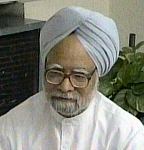Manmohan calls for three-pronged strategy to improve India-China business ties
Beijing, Jan. 14:  Setting the roadmap for enhancement of business ties between India and China at the India-China Economic Trade and Investment Summit here this morning, the Prime Minister, Dr. Manmohan Singh, suggested a three-pronged strategy to achieve this key objective.
Setting the roadmap for enhancement of business ties between India and China at the India-China Economic Trade and Investment Summit here this morning, the Prime Minister, Dr. Manmohan Singh, suggested a three-pronged strategy to achieve this key objective.
Addressing captains of Indian and Chinese industry, Dr. Singh said that both must first develop a strategic plan for the future that promoted their "vision of economic cooperation and roadmap for its implementation".
This, he said, would ensure a long-term strategic perspective that looks ahead to "future challenges and opportunities guiding our ties."
Secondly, he said, there is a need for the businessmen of the two countries to "develop profitable business models that factoe in our complementarities and competitive strengths, and the special needs of large markets like ours."
Thirdly, is the need for acquiring insights into each other's markets, business customs and management styles, he said.
"Doing business is about developing understanding and trust in your partners. A deeper understanding of the macro-economic outlook, the regulatory regimes and of factors that have a bearing on the competitiveness of enterprises," was the need of the hour, the Prime Minister said.
Lauding both Indian and Chinese businessmen for their enterprise and dynamism in taking the bilateral economic relationship to heights unimaginable till a few years ago, Dr. Singh identified them as "symbols of the growth stories in India and China.
Their day-long summit-level meeting on Tuesday, he said, should be seen as an expression of confidence in the potential for economic cooperation between the two countries. Predicting that both India and China were poised to regain their weight in the global economy in the 21st century, Dr. Singh said: "Our two countries will need to work together to ensure that we contribute to, even as we benefit from the economic resurgence and integration of Asia."
These two engines of economic growth must use "our natural and human resources, technology and capital for the common benefit of the region", he said.
Mention was also made of the Indian economy's growth rate of nine percent in the last three years. The Prime Minister said that a series of economic reform measures have been undertaken to facilitate both investment and growth. The present government's savings and investment rates too has increased to 35 percent of the GDP, and continues to increase, he added.
Bilateral trade with China has doubled in the last two years, and what was of significance and immense satisfaction to both was that the trade target of 20 billion dollars set for 2008 had been achieved in 2006, and the revised target of 40 billion dollars would be achieved in 2008, also two years ahead of schedule, he said.
Dr. Singh said this had left him wondering whether the two governments were underestimating the capabilities of respective industries and their strong urge to do business with each other.
Proposing to set more ambitious targets, the Prime Minister said that the challenge before India is to diversify the bilateral export basket to China and pursue export opportunities vigourously, especially in non-traditional items.
He said there was also a need for diversifyin the agricultural production base in the two countries, and this would only be possible with a conducive environment.
Commenting on the potential of the services sector in both countries, Dr. Singh said India has had considerable success in positioning itself in hi-tech services in world markets, and therefore, "there are enormous opportunities for both to expand trade in services, particularly in construction and engineering, education, entertainment, financial services, IT and IT-enabled services, transport, tourism and health."
"We will work together with the Chinese Government to remove administrative barriers and simplify regulatory regimes in order to move forward in these areas," he said.
With China having contracted projects worth 12 billion U. S. dollars and India actively engaged in joint venture projects and subsidiaries in China, Dr. Singh said a can do spirit needed to prevail in both the traditional and non-traditional sectors of bilateral trade cooperation to achieve greater heights of economic engagement.
Competition, he said, is not inconsistent with cooperation and nor is it adversarial. Economic cooperation is and should continue to be the "principal driver" of the strategic and cooperative partnership for peace and prosperity.
The Joint Study Group set up in 2003, he said has finalised its report for ways to enhance economic cooperation under the India-China Regional Trading Arrangement, and that should be used to discuss further steps towards progress, the Prime Minister concluded. (ANI)